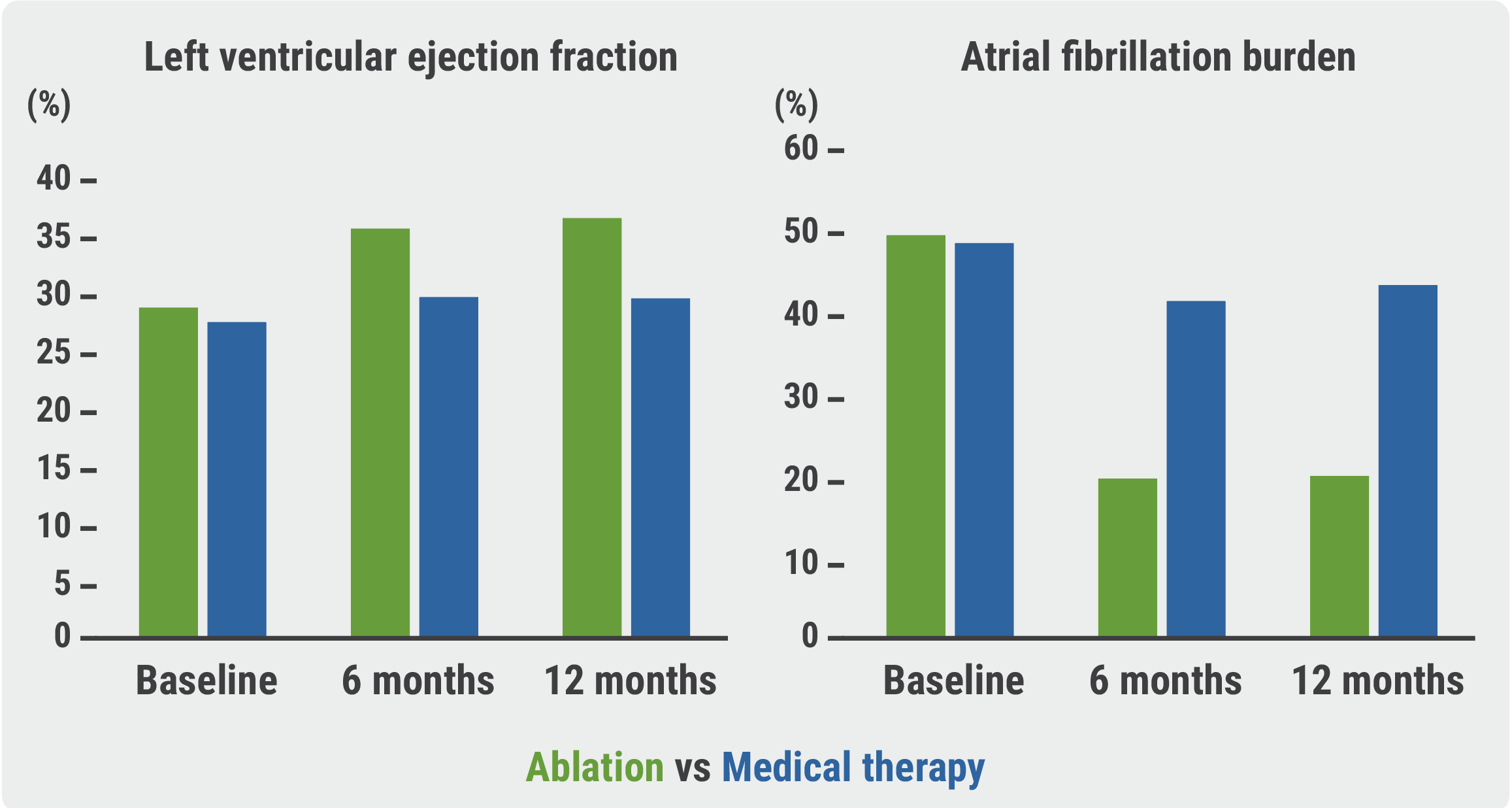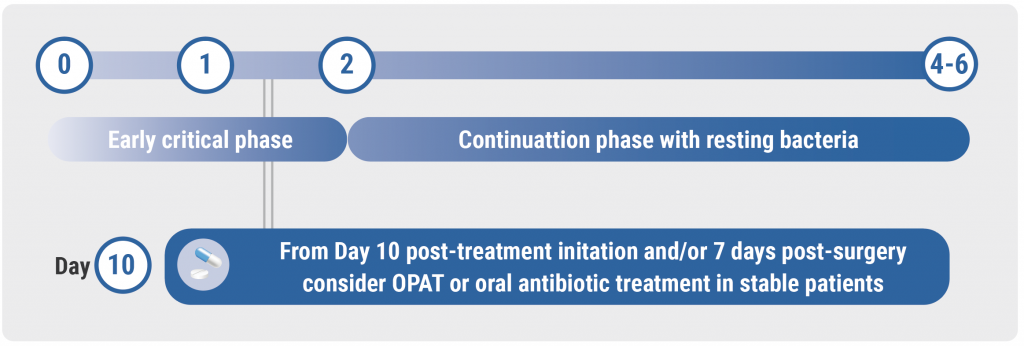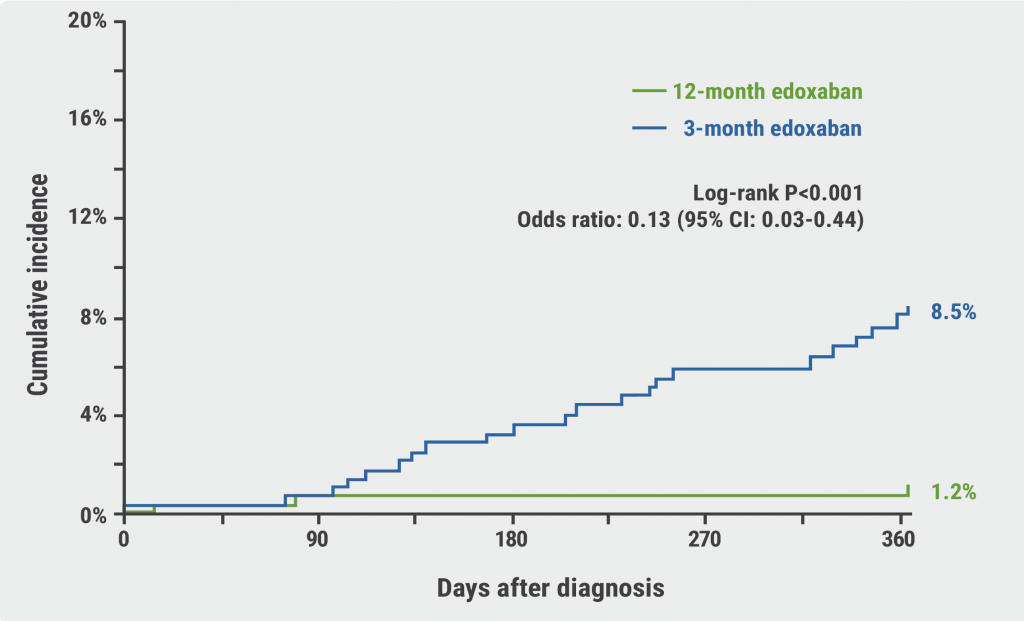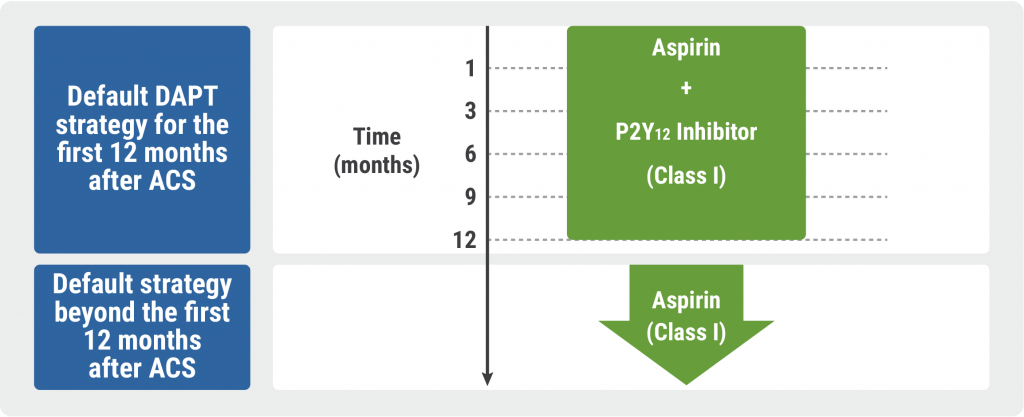https://doi.org/10.55788/2d226df6
“Although we know that catheter ablation reduces mortality and worsening of HF in patients with HF and symptomatic AF, it is not yet established whether this effect translates to patients with end-stage HF eligible for heart transplant or LV assist device,” argued Prof. Christian Sohns (Heart and Diabetes Center NRW, Germany) [1,2]. To investigate this matter, the CASTLE-HTx trial (NCT04649801) randomised 194 participants with end-stage HF and symptomatic AF who were potential candidates for heart transplantation 1:1 to catheter ablation and guideline-directed medical therapy or medical therapy alone [3]. The primary outcome was a composite of all-cause mortality, LV assist device implantation, or urgent heart transplantation. The trial was terminated for efficacy earlier than planned, after 18 months of follow-up.
Ablation was superior to medical therapy in terms of the primary endpoint (HR 0.24; 95% CI 0.11–0.52; P<0.001). This effect was mainly driven by a reduction in death from any cause in the ablation arm (HR 0.09; 95% CI 0.01–0.70; P<0.005). LV assist device implantations (n=10 vs n=1) and urgent heart transplantations (n=6 vs n=1) both occurred more frequently in the medical therapy arm. Prof. Sohns showed that these effects can be explained by an improved LV function and a reduced AF burden in the ablation arm compared with the medical therapy arm (see Figure).
Figure: Impact on left ventricular function and AF burden [2]

In conclusion, ablation for AF led to fewer deaths, LV assist device implantations, and urgent heart transplantation in patients with end-stage HF, as compared with medical therapy alone.
- Marrouche NF, et al. N Engl J Med 2018;378(5):417–427.
- Sohns C, et al. CASTLE-HTx: Catheter ablation versus medical therapy to treat atrial fibrillation in end-stage heart failure. Hot Line Session 6, ESC Congress 2023, 25–28 August, Amsterdam, the Netherlands.
- Sohns C, et al. N Engl J Med 2023; Aug 27. DOI: 10.1056/NEJMoa2306037.
Copyright ©2023 Medicom Medical Publishers
Posted on
Previous Article
« Immediate or staged revascularisation in STEMI plus multivessel disease? Next Article
CRT upgrade benefits patients with HFrEF and an ICD »
« Immediate or staged revascularisation in STEMI plus multivessel disease? Next Article
CRT upgrade benefits patients with HFrEF and an ICD »
Table of Contents: ESC 2023
Featured articles
How to manage arterial thrombosis and thromboembolism in COVID-19?
2023 ESC Guidelines & Updates
Heart failure: the 2023 update
Guidelines for Acute Coronary Syndrome
Guidelines for the management of cardiomyopathies
Cardiovascular disease and diabetes: new guidelines
Guidelines for the management of endocarditis
Trial Updates in Heart Failure
Traditional Chinese medicine successful in HFrEF
CRT upgrade benefits patients with HFrEF and an ICD
Catheter ablation saves lives in end-stage HF with AF
Meta-analysis: Does FCM improve clinical outcomes in HF?
HEART-FID: Is intravenous ferric carboxymaltose helpful in HFrEF with iron deficiency?
Natriuresis-guided diuretic therapy to facilitate decongestion in acute HF
DICTATE-AHF: Early dapagliflozin to manage acute HF
STEP-HFpEF: Semaglutide safe and efficacious in HFpEF plus obesity
Key Research on Prevention
Does colchicine prevent perioperative AF and MINS?
Diagnostic tool doubles cardiovascular diagnoses in patients with COPD or diabetes
Inorganic nitrate strongly reduces CIN in high-risk patients undergoing angiography
Finetuning Antiplatelet and Anticoagulation Therapy
Should we use anticoagulation in AHRE to prevent stroke?
Results of FRAIL-AF trial suggest increased bleeding risk with DOACs
The optimal duration of anticoagulation therapy in cancer patients with DVT
DAPT or clopidogrel monotherapy after stenting in high-risk East-Asian patients?
Assets for ACS and PCI Optimisation
Immediate or staged revascularisation in STEMI plus multivessel disease?
Lp(a) and cardiovascular events: which test is the best?
No benefit of extracorporeal life support in MI plus cardiogenic shock
Functional revascularisation outperforms culprit-only strategy in older MI patients
Can aspirin be omitted after PCI in patients with high bleeding risk?
Angiography vs OCT vs IVUS guidance for PCI: a network meta-analysis
OCTOBER trial: OCT-guided PCI improves clinical outcomes in bifurcation lesions
Other
Minimising atrial pacing does not reduce the risk for AF in sinus node disease
ARAMIS: Can anakinra alleviate acute myocarditis?
Expedited transfer to a specialised centre does not improve cardiac arrest outcomes
Acoramidis improves survival and functional status in ATTR-CM
Related Articles

October 30, 2023
Guidelines for the management of endocarditis


October 30, 2023
Guidelines for Acute Coronary Syndrome
© 2024 Medicom Medical Publishers. All rights reserved. Terms and Conditions | Privacy Policy
HEAD OFFICE
Laarderhoogtweg 25
1101 EB Amsterdam
The Netherlands
T: +31 85 4012 560
E: publishers@medicom-publishers.com

